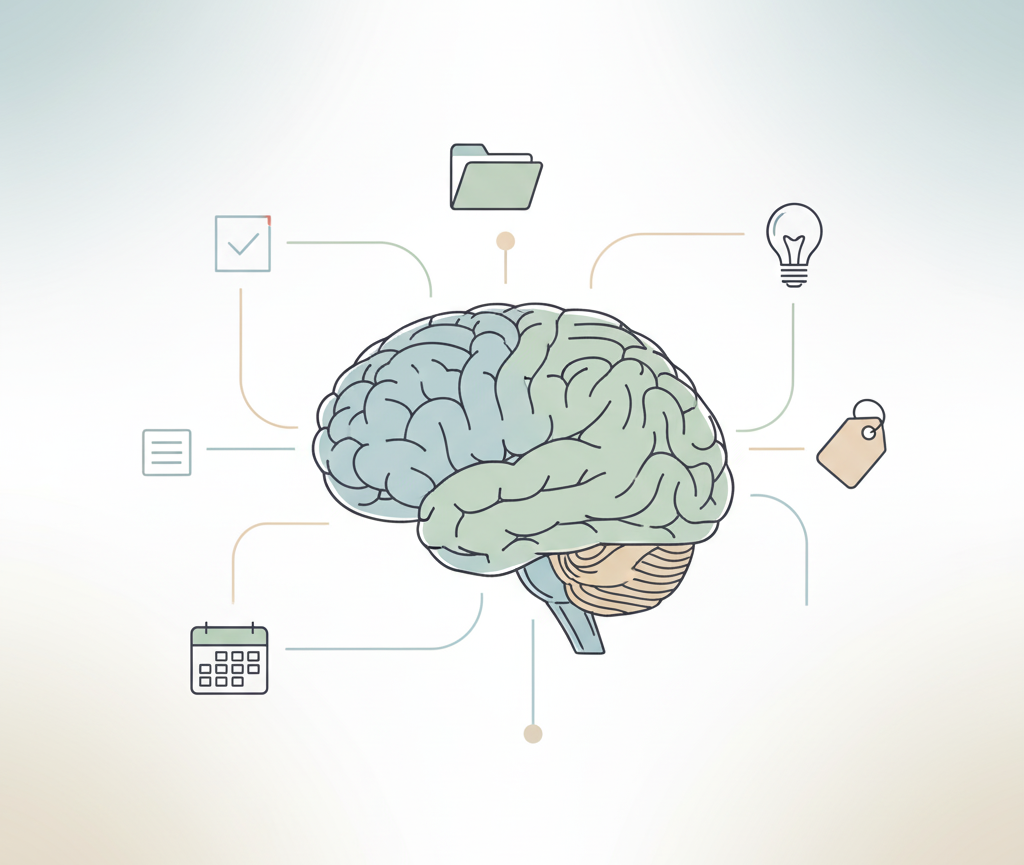Turn mental chaos into clarity with the right systems for creative flow.
Introduction
Have you ever had a brilliant idea… only to lose it five minutes later? Maybe it came while you were commuting, walking your dog, or brushing your teeth — and before you knew it, poof, it was gone. Most of us don’t struggle with having ideas; we struggle with keeping them organized long enough to do something meaningful with them.
If you’ve read my previous article, How to Build a Personal Knowledge System, you already know that creating a home for your ideas is the foundation of mindful productivity. But the question many readers ask next is: “Which tools actually make this easier?”
That’s what this post is about. Today, we’ll look at five powerful tools that help you organize your ideas seamlessly — without adding complexity or chaos. By the end, you’ll know exactly which platforms can help you build a calm, efficient, and truly usable knowledge system.
1. Notion — The All-in-One Idea Architect
If your brain feels like a thousand open browser tabs, Notion is like closing them all into one clean workspace. It’s flexible, intuitive, and endlessly customizable — making it a favorite for creatives, entrepreneurs, and digital learners.
You can create linked databases, dashboards, and visual boards to organize everything from fleeting thoughts to long-term projects.
What makes it shine:
- Combine notes, tasks, and databases in one space.
- Create templates for recurring workflows (content planning, reading lists, idea capture).
- Collaborate or keep your system private — it scales with your needs.
Pro tip: I use Notion as the hub of my personal knowledge system. Every idea, quote, or resource eventually finds its way there. It’s like my digital second brain — tidy, flexible, and always accessible.
Key takeaway: If you love structure but crave flexibility, Notion is your creative command center.
2. Obsidian — The Networked Thinking Powerhouse
Notion is great for structure, but sometimes you need something deeper — something that connects ideas in a web-like way. That’s where Obsidian shines.
Built on a simple folder of Markdown files, Obsidian links your notes like a mind map. This “networked thinking” approach mirrors how your brain naturally connects ideas — perfect for researchers, writers, and lifelong learners.
Highlights:
- Visual graph view helps you see how ideas relate.
- Offline-first — your data is 100% yours.
- Supports tags, backlinks, and community plugins for customization.
Example: I once revisited an old note in Obsidian about “creative flow,” and discovered links to notes I’d written months earlier on “mental energy” and “decision fatigue.” The result? A brand-new article idea that connected them all.
Key takeaway: Obsidian helps you see patterns you didn’t know existed — it’s a tool for thinkers who love depth.
3. Evernote — The Reliable Classic for Capture
Evernote may not be the newest tool, but it remains one of the most reliable for idea capture. It’s the kind of app you can trust to “just work.”
It’s especially powerful for quickly saving ideas from multiple sources — emails, web pages, voice notes, or photos — and syncing them across devices.
Why it still deserves a place:
- Robust search (even inside PDFs and images).
- Easy clipping from the web or email.
- Works across platforms seamlessly.
For people who don’t want to build a system from scratch, Evernote provides structure out of the box. It’s like a digital filing cabinet that never gets dusty.
Key takeaway: Evernote is perfect for those who want a dependable, ready-made way to capture everything — fast.
4. Apple Notes (or Google Keep) — The Everyday Essential
Not every tool needs to be fancy. Sometimes, the best system is the one you’ll actually use every day.
Apple Notes and Google Keep both excel at quick capture — jotting down thoughts in the moment. They sync instantly, and their simplicity encourages consistency.
Best use cases:
- Capturing spontaneous ideas on the go.
- Quick checklists and reminders.
- Saving quotes, links, or article snippets for later.
Pro tip: I use Apple Notes as my “inbox” for ideas — then once a week, I transfer the best ones into Notion for deeper organization.
Key takeaway: A simple, fast capture tool keeps your knowledge system alive — it’s the bridge between chaos and clarity.
5. Readwise — The Hidden Gem for Lifelong Learners
If you highlight articles, eBooks, or PDFs but never revisit them, Readwise will change your relationship with learning.
It automatically imports your highlights from Kindle, Pocket, Instapaper, or even physical books (via OCR), and resurfaces them using spaced repetition — so your best insights never fade away.
Why it’s a game-changer:
- Syncs with tools like Notion and Obsidian.
- Helps you review knowledge effortlessly.
- Keeps learning fresh through daily email digests.
Affiliate note: I personally use Readwise to connect my Kindle highlights directly to Notion. It’s the easiest way I’ve found to make reading part of my ongoing learning loop.
Key takeaway: Readwise turns passive reading into active knowledge growth.
Putting It All Together

Here’s the truth: no single tool can do it all — and that’s okay.
Your personal knowledge system will likely blend several of these, each playing a different role.
For example:
- Use Apple Notes to capture ideas quickly.
- Store and connect insights in Notion or Obsidian.
- Sync your reading highlights through Readwise.
- Keep archived resources neatly filed in Evernote.
The secret is balance: don’t overcomplicate it. The best system is the one you’ll actually maintain.
Conclusion
Ideas are living things — they need structure, space, and consistency to grow. With the right tools, you can stop chasing inspiration and start cultivating it.
Each of the five tools above offers a unique way to organize your thoughts, from quick capture to deep connection. Start small, experiment, and notice which tools fit your natural rhythm of thinking.
And if you haven’t yet built your foundation, go back to How to Build a Personal Knowledge System — it’s the perfect next step for turning scattered thoughts into a sustainable flow of clarity and growth.


